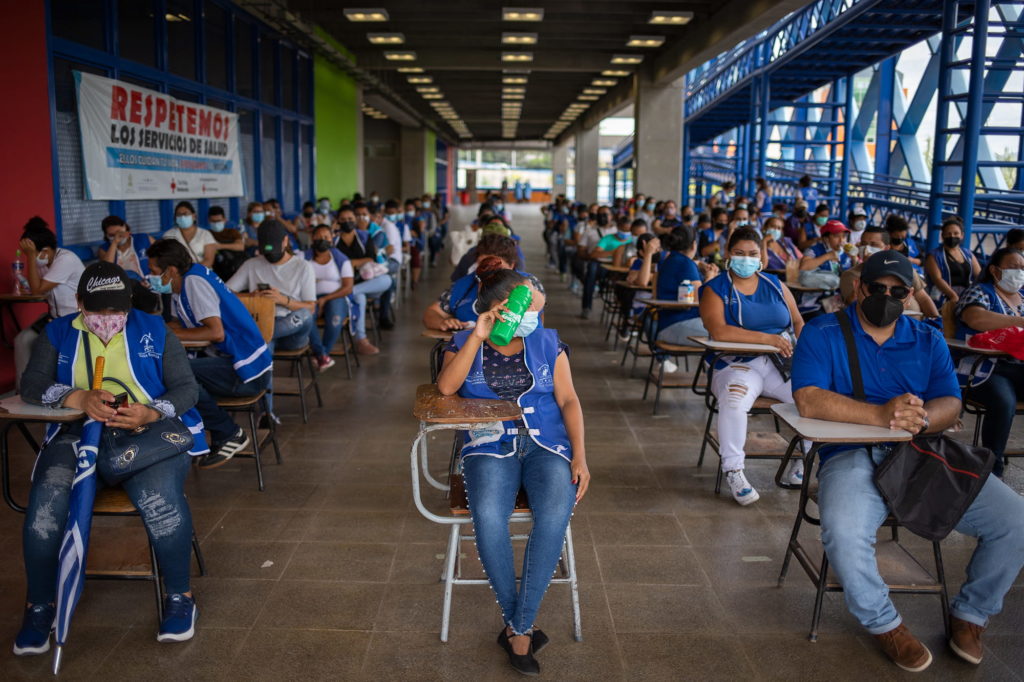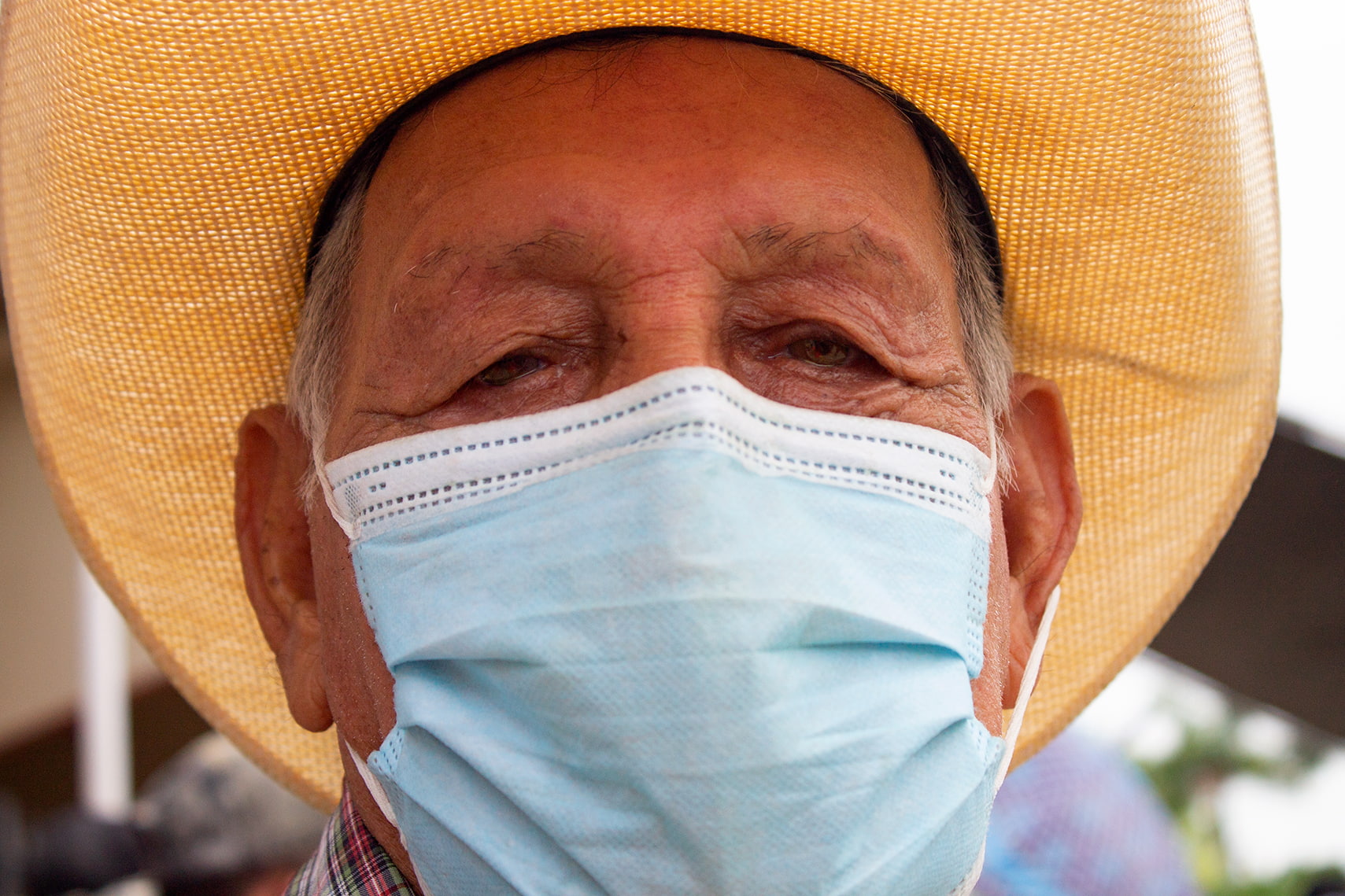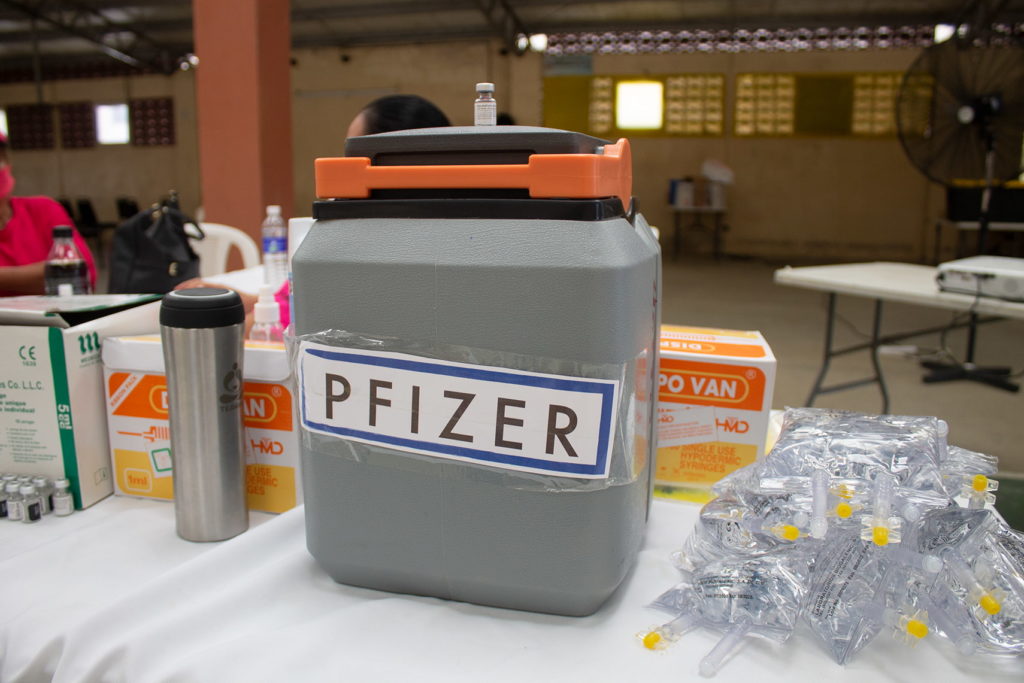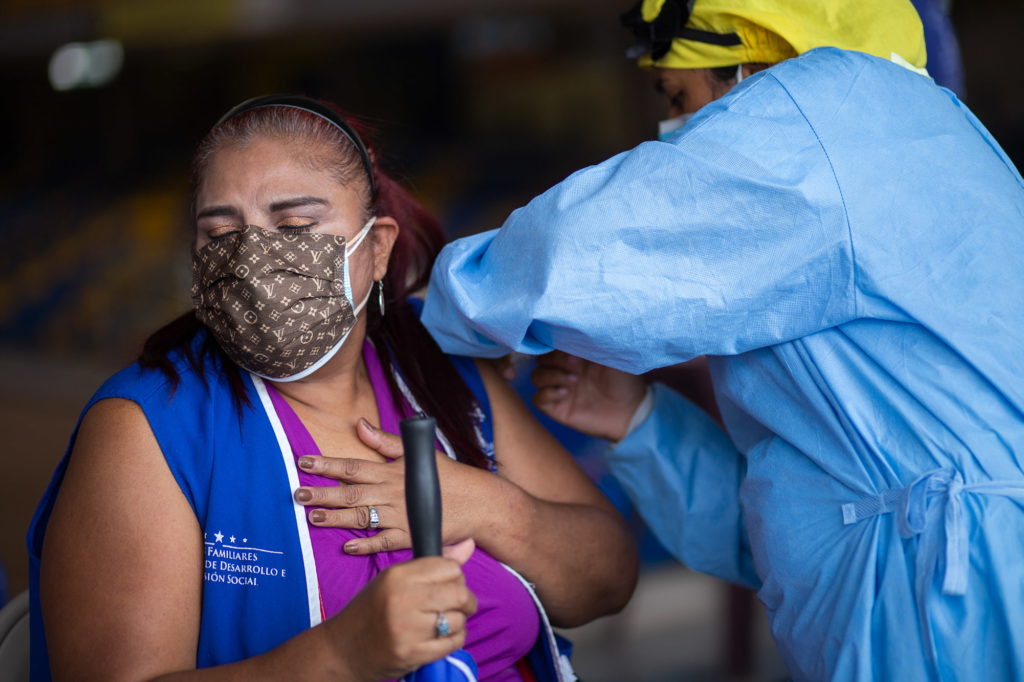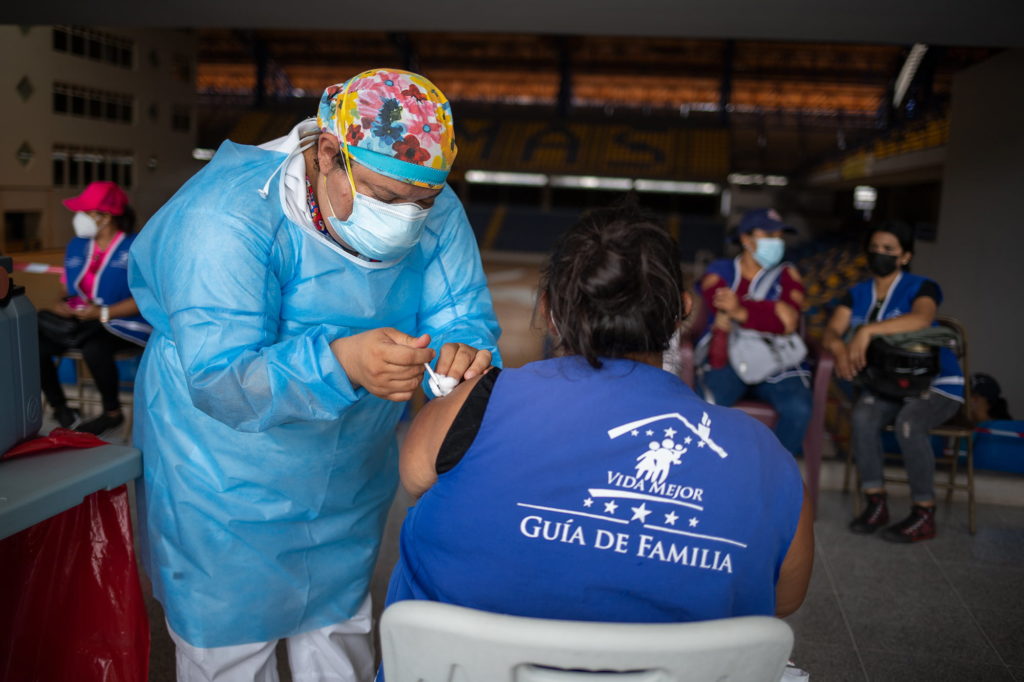People are increasingly denouncing the National Party’s politicization of vaccinations in Honduras. These complaints not only criticize the national government, but also some mayors who are taking advantage of the situation to gain favor among the electorate and garner more votes in the November general elections.
By Leonardo Aguilar
Photos by Martín Cálix and Sandra Ruiz
“I walked here; it took me about 40 minutes. But they still haven’t told me whether I’m going to be vaccinated today,” says 71-year-old Luis Alonso Morales. It was 9:00 am and the sun was already burning hot in the northern Honduran city of El Progreso, Yoro. A week ago, Morales tried for the third time to get vaccinated, but was unsuccessful even though his age group had been scheduled for vaccination in May.
Waiting next to him is 57-year-old Adan Gómez, who was anxiously asking if there were vaccines to be had at the El Progreso Chamber of Commerce and Industry, the designated location for getting the first dose of the Moderna vaccine.
“Here, we are waiting outside in the hot sun and there is no one who can tell us where we should keep waiting or leave,” he says. Both men are over 50 and have underlying health conditions, yet didn’t know that much younger people were already inside getting vaccinated.
Fredy Guillen, the vice minister of public health, recently stated that the government had obtained 4.5 million vaccine doses, enough to immunize 2.2 million Hondurans. “We expect to receive a substantial number of doses in the coming weeks from bilateral purchases made with the Russian Investment Fund and Pfizer. We expect that 50% of the eligible population will be vaccinated by the end of this year.”
Data from Johns Hopkins University and the Pan American Health Organization (PAHO), published in late July, indicates that the Latin American countries with the highest percentage of fully vaccinated people are Chile (63.61%) and Uruguay (61.47%). Honduras and Haiti have only vaccinated a little over 1% of their populations.
Vacunatón ⎼ the Honduran government’s most ambitious vaccination program
Just a few months before the November general elections, the Honduran government has launched the Vacunatón program, a vaccination marathon that hopes to vaccinate as many people as possible with mostly donated doses.
In a July 26 press conference, President Juan Orlando Hernández and Alba Consuelo Flores, the minister of public health, announced a task force composed of personnel from various government ministries who carried out the Vacunatón program that took place on July 31-August 1.
“We want to vaccinate the entire population over the age of 25. Also, the epidemiological trends observed over the last four weeks show that the epicenter of the pandemic is in Tegucigapla’s Central District. This has led us to rethink several strategies, such as replicating the Vacunatón program in all the municipal capitals,” said Flores.
On the surface, Vacunatón appears to be an effective vaccination program, as well as a valuable propaganda and publicity tool. But Honduras continues to be a worldwide laggard in terms of vaccine acquisition and immunization. The Ministry of Public Health, led by the ruling National Party, is responsible for administering vaccines throughout Honduras. But the country’s 298 municipalities are mostly governed by mayors from the Liberal Party and the Liberty and Refoundation Party (Libertad y Refundación – Libre), who have decried the mismanagement and politicization of vaccination programs.
Some mayors from the opposition ⎼ who know all about clientelism because they do it too ⎼ note that the National Party is gaining ground by politicizing vaccination programs. They have reacted by denouncing the National Party and mobilizing their people to the vaccination centers. This has led to some verbal altercations at the centers between opposing party activists. Due to these confrontations, some people who are not aligned with any political party were able to get vaccinated.
The Liberal Party released photos of National Party activists getting vaccinated in buses carrying banners promoting presidential candidate Nasry “Tito” Asfura.
The Liberal Party’s Central Executive Council released a statement on July 12 claiming that political criteria are being used to determine how and where vaccination programs are being conducted, and that these programs are being manipulated to promote the National Party. The statement says, “Frankly, this is an abuse and those responsible – government officials and National Party campaign officials – should be strictly disciplined.”
The statement also levelled a more serious charge: vaccinations are being delayed for electoral purposes, causing the deaths of thousands of unvaccinated Hondurans, “Clearly, the National Party is intentionally delaying vaccination efforts so that they coincide with electoral campaigns, in order to gain political advantage.”
On July 14, a Liberal Party legal commission delivered documents and evidence to the non-governmental National Anticorruption Council (Consejo Nacional Anticorrupción – CNA), asking it to formally condemn this corruption and to investigate the National Party’s manipulation of the COVID-19 vaccine for political advantage.
The Ministry of Justice is the only institution with the authority to conduct criminal prosecutions in Honduras. As such, it alone can prosecute any criminal violation of the health-related rights guaranteed by the Honduran Constitution. However, the CNA is a civil society organization that has broad international and media support for its public watchdog role.
Honduran sociologist Julio Navarro notes that political clientelism has increased over the last decade, a trend that coincides with the National Party’s domination of the political landscape since the 2009 coup that ousted then president Jose Manuel Zelaya. Navarro points to government welfare programs and political clientelism such as the “Solidarity” food basket giveaways, free fertilizer and urea distributions, cash bonus programs, and student scholarships.
“But something as sensitive and consequential as vaccinations during this pandemic cannot be filtered through the government’s political prism or manipulated by some politically ambitious mayors who use vaccination programs to further their campaigns. This is reprehensible … for people to be vaccinated based on their political affiliations,” said Navarro in an interview with Contracorriente.
He believes that a fundamental right is being violated, given that the international community has donated 92% of the vaccines delivered to Honduras. He claims that National Party activists get in line with people waiting to be vaccinated and try to recruit them to the National Party’s side.
Buses bearing National Party banners are frequently seen arriving at vaccination centers with party activists who ignore the priority population groups and jump ahead of other people waiting in line, says sociologist Julio Navarro.
In an interview with Contracorriente, Dr. Suyapa Figueroa, the president of the Honduran Medical Association, said that they have advised donor agencies to ensure that vaccines are applied systematically, prioritizing the most vulnerable people and groups, “We must prevent anyone from using the vaccine as a tool to win votes, and prevent our government from manipulating vaccination programs to its advantage. If these abuses are corroborated, the Honduran Medical Association will condemn them internationally, because such practices are unacceptable.”
Dr. Figueroa added that 99% of the vaccines administered so far in Honduras have been donated by the international community, and that the Honduran government has only made a minor purchase that accounts for less than 1% of the doses administered, “We recently lost a colleague who never received her second dose of the Sputnik vaccine and subsequently died from COVID-19. Her death could have been prevented by that second dose.”
A recent Contracorriente report revealed that the government will need almost 14 million doses to vaccinate 7 million people. According to data provided by the Ministry of Public Health, Honduras needs to purchase 8.6 million doses and the Honduran Institute of Social Security (IHSS) will provide enough doses to vaccinate its 700,000 members. The rest of the doses will be obtained via donations from other countries or through the COVAX initiative and the World Health Organization.
Of the 2.98 million doses received so far, the Honduran government has only paid for 201,610 of them. These have been purchased from Pfizer and the Russian Direct Investment Fund. Israel, the United States, El Salvador and Mexico have donated more than 2.5 million vaccines. The remaining 658,040 vaccines were donated through COVAX.

